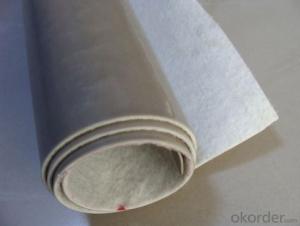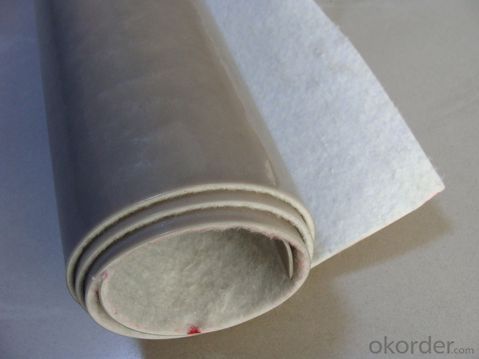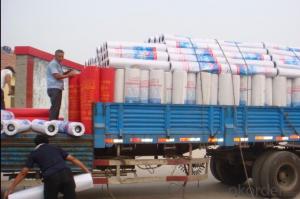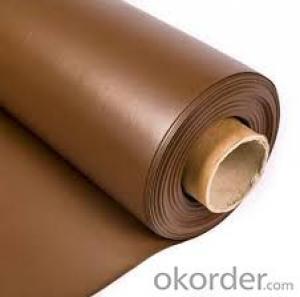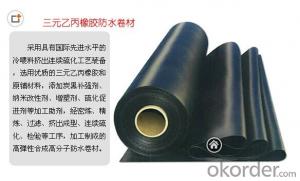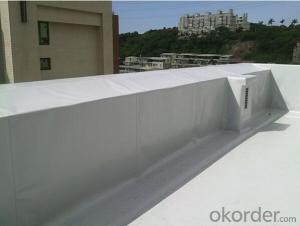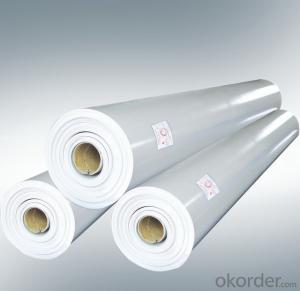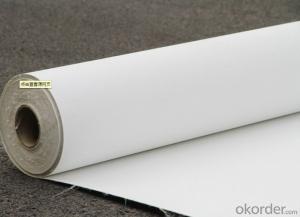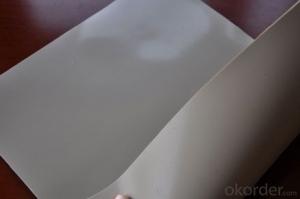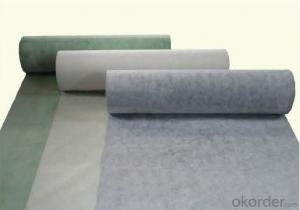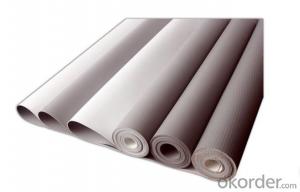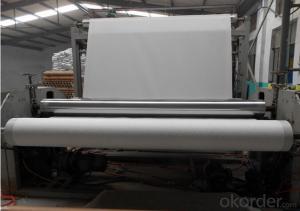Polyvinyl Chloride PVC Reinforced Waterproof Membrane
- Loading Port:
- China main port
- Payment Terms:
- TT OR LC
- Min Order Qty:
- 5000 m²
- Supply Capability:
- 100000 m²/month
OKorder Service Pledge
OKorder Financial Service
You Might Also Like
Introduction
Polyvinyl Chloride (PVC) waterproof membrane is a new polymer waterproof membrane which is made from polyvinyl chloride resin, and mixed with plasticizer, filler, antioxygen, ultraviolet absorber and other auxiliaries.
Specification
No. | Item | L | N | W | ||||
I | II | I | II | I | II | |||
1 | Tensile strength N/cm ≥ | 100 | 160 | 8 | 12 | 100 | 160 | |
2 | fracture elongation %≥ | 150 | 200 | 200 | 200 | 150 | 200 | |
3 | Dimension Changing at heating %≤ | 1.5 | 1 | 3 | 2 | 1.5 | 1 | |
4 | Foldability at low temperature °C | -20 | -25 | -20 | -25 | -20 | -25 | |
5 | Water tightness | No leakage | No leakage | No Leakage | ||||
6 | Joint shear resistance (N/mm)≥ | 3 | 3 | 6 | ||||
7 | Thermal Ageing treatment | Appearance | no bubble | no bubble | no bubble | |||
Tensile strength changing rate % | ±25 | ±20 | ±25 | ±20 | ±25 | ±20 | ||
Breaking elongation changing rate% | ||||||||
8 | Chemical corrosion resistance | foldability at low temperature °C | -15 | -20 | -15 | -20 | -15 | -20 |
Tensile strength changing rate % | ±25 | ±20 | ±25 | ±20 | ±25 | ±20 | ||
Breaking elongation changing rate% | ||||||||
9 | Artificial climate accelerated aging | foldability at low temperature °C | -15 | -20 | -15 | -20 | -15 | -25 |
Tensile strength changing rate % | ±25 | ±20 | ±25 | ±20 | ±25 | ±20 | ||
Breaking elongation changing rate% | ||||||||
Applications
1) All kinds of roofs, such as steel structure roof, planted roof etc.
2) Underground engineering, such as building basement, subways, tunnels, air raid shelter, etc.
3) Other projects like artificial lake, dam, water reservoir, grain storehouse, etc.
Characteristic:
1. Good combination of high elasticity and tensile strength.
2. Fine resistance to static electricity.
3. Excellent resistance to ageing / weathering.
4. Durable, the effective age can be more than 20 years used on exposed surfaces, used on non-exposed surfaces, it can reach 50 years.
5. Fine flexibility at low temperature, adaptable to cold conditions. 6. Root-resistance, can be used on the planting roofs.
7. Fine puncture resistance, joint peel strength and joint shear strength.
8. Fine UV-resistance, no pollution to environment.
9. Easily welding, installing, secure.
10. Easy treatments to the delicate parts of corners and edges. 11. Convenient maintenance with low cost. Polyvinyl Chloride (PVC) membrane with fiber reinforced layeron the back is widely used in the roofs of civil buildings, tunnels, channels, subways,
RFQ
1. What is your MOQ?
--Our MOQ is 5000 m2
2. Can you provide sample?
--Yes, samples are in stock. we can offer free sample for you.
3. Do you offer OEM service?
--Yes, we can print customers’ logo on the packaging;
And the size and specification can be produced and design according to your demand.
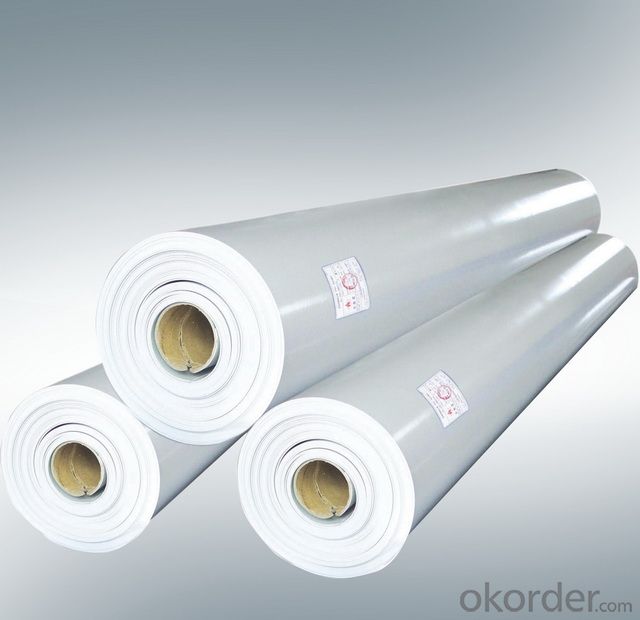
- Q: Can a waterproofing membrane be used on precast concrete surfaces?
- Precast concrete surfaces, commonly used in construction for walls, floors, and roofs, are prone to water penetration. This can lead to damage and deterioration over time. To address this issue, the application of a waterproofing membrane is recommended. A waterproofing membrane is a thin layer of material, typically made of bitumen, rubber, or PVC, that is designed to prevent the passage of water. By applying this membrane to the precast concrete surface, it acts as a barrier, effectively stopping water from seeping into the concrete. There are several advantages to using a waterproofing membrane on precast concrete surfaces. Firstly, it helps to prolong the lifespan of the concrete by protecting it from water damage. Cracking, reinforcement corrosion, and the growth of mold and mildew can be minimized or avoided altogether. Secondly, the use of a waterproofing membrane improves the overall performance of the precast concrete. By preventing water penetration, the structural integrity of the concrete is maintained. Additionally, it ensures a dry and comfortable environment inside buildings by preventing water leakage. Lastly, a waterproofing membrane provides extra protection against other elements such as chemicals and UV rays. Certain membranes are resistant to chemical exposure, which is advantageous in industrial or commercial settings. Some membranes also possess UV-resistant properties, safeguarding against damage caused by prolonged exposure to sunlight. In conclusion, the application of a waterproofing membrane on precast concrete surfaces is an effective solution to prevent water penetration and safeguard the concrete from damage. It is a cost-effective and efficient method to ensure the durability and longevity of precast concrete structures.
- Q: Can a waterproofing membrane be used for a restaurant kitchen floor?
- Yes, a waterproofing membrane can be used for a restaurant kitchen floor. Restaurant kitchens are prone to spills and water exposure, so it is essential to have a waterproofing system in place to protect the underlying structure. A waterproofing membrane can provide a seamless and impermeable barrier, preventing water, oil, and other liquids from seeping into the floor and causing damage. Additionally, these membranes are often resistant to chemicals and can withstand heavy foot traffic, making them suitable for the demanding environment of a restaurant kitchen.
- Q: Can a waterproofing membrane be used in conjunction with insulation materials?
- Yes, a waterproofing membrane can be used in conjunction with insulation materials. The membrane acts as a barrier to prevent water infiltration, while insulation materials provide thermal resistance to control heat flow. This combination is commonly used in construction to ensure both waterproofing and insulation performance.
- Q: Can a waterproofing membrane be used in areas with extreme weather conditions, such as hurricanes or snowstorms?
- Areas with extreme weather conditions, such as hurricanes or snowstorms, can benefit from the use of a waterproofing membrane. These membranes are designed to create a protective barrier against water infiltration and can withstand various weather conditions effectively. They are made from moisture-resistant materials and can be installed in roofs, basements, or foundations. In regions prone to hurricanes, waterproofing membranes play a crucial role in preventing water damage. They create a barrier that keeps water out, even during heavy rainfall or storm surges. These membranes are often reinforced and possess high tensile strength to withstand the strong winds and pressure associated with hurricanes. Similarly, in areas experiencing heavy snowstorms, waterproofing membranes are valuable in preventing water intrusion caused by melting snow or ice dams. They are designed to be flexible and resistant to extreme temperatures, ensuring their integrity and leak prevention in freezing conditions. However, it is essential to select the appropriate type of waterproofing membrane for the specific weather conditions in the area. Different membranes offer varying levels of resistance to extreme weather, so consulting with a professional is advisable to determine the most suitable membrane for the climate and weather patterns. Additionally, proper installation and regular maintenance are crucial to ensure the longevity and effectiveness of the waterproofing system in extreme weather conditions.
- Q: Is a waterproofing membrane resistant to chemicals?
- Yes, a waterproofing membrane is typically resistant to chemicals. Waterproofing membranes are designed to provide a protective barrier against water and other liquids, including chemicals. These membranes are made of materials that are chemically resistant, such as PVC (polyvinyl chloride), TPO (thermoplastic olefin), or EPDM (ethylene propylene diene monomer). These materials have excellent resistance to a wide range of chemicals, including acids, alkalis, solvents, and oils. Additionally, waterproofing membranes undergo rigorous testing to ensure their chemical resistance and durability. However, it is important to note that the specific chemical resistance may vary depending on the type and quality of the membrane. It is always recommended to consult the manufacturer's specifications and guidelines to ensure the membrane's compatibility with specific chemicals.
- Q: Can a waterproofing membrane be used for a hospital?
- Yes, a waterproofing membrane can be used for a hospital. Waterproofing membranes are commonly used in hospitals to prevent water infiltration and protect the building from water-related damages. They are especially useful in areas with high moisture levels such as bathrooms, basements, and roofs. By installing a waterproofing membrane, hospitals can ensure a dry and safe environment for both patients and staff, reducing the risk of mold, mildew, and structural deterioration caused by water damage.
- Q: Can a waterproofing membrane be used in conjunction with soundproofing materials?
- Yes, a waterproofing membrane can be used in conjunction with soundproofing materials. While the primary function of a waterproofing membrane is to prevent water infiltration, it can also contribute to sound insulation to some extent. However, for optimal soundproofing, it is recommended to use dedicated soundproofing materials such as acoustic insulation or soundproof panels in addition to the waterproofing membrane.
- Q: Can a waterproofing membrane be used in balconies or decks?
- Waterproofing membranes can be utilized in balconies or decks to prevent water penetration and safeguard underlying structures against moisture damage. Balconies and decks are frequently exposed to various weather conditions, including rain and snow, which can result in water damage and deterioration. By installing a waterproofing membrane, a barrier is established that hinders water from seeping into the underlying structure, ensuring its long-lasting and sturdy nature. Moreover, waterproofing membranes also provide protection against other forms of water damage, such as the growth of mold and mildew, which can compromise the integrity of the balcony or deck. In summary, the use of a waterproofing membrane is an efficient solution to maintain the functionality and prolong the lifespan of balconies or decks.
- Q: Can a waterproofing membrane be used on nickel surfaces?
- Indeed, nickel surfaces can benefit from the use of a waterproofing membrane. These membranes are frequently employed in construction and building ventures to safeguard surfaces against water damage and moisture infiltration. They serve as a barrier, preventing water from seeping through the surface and causing harm. Like any other metal surfaces, nickel surfaces can be vulnerable to corrosion and water-induced damage. By applying a waterproofing membrane, the nickel surface can be effectively shielded from water and moisture, thereby prolonging its lifespan and preserving its integrity. However, it is crucial to guarantee that the chosen waterproofing membrane is suitable for use on nickel surfaces. Different membranes may have distinct compatibility requirements, which is why it is advisable to consult the manufacturer or a professional for guidance on proper application and compatibility.
- Q: Are waterproofing membranes resistant to chemicals?
- Yes, waterproofing membranes are generally resistant to chemicals. They are designed to provide a barrier against water, moisture, and various chemicals, making them highly effective in protecting surfaces against chemical damage.
Send your message to us
Polyvinyl Chloride PVC Reinforced Waterproof Membrane
- Loading Port:
- China main port
- Payment Terms:
- TT OR LC
- Min Order Qty:
- 5000 m²
- Supply Capability:
- 100000 m²/month
OKorder Service Pledge
OKorder Financial Service
Similar products
Hot products
Hot Searches
Related keywords
